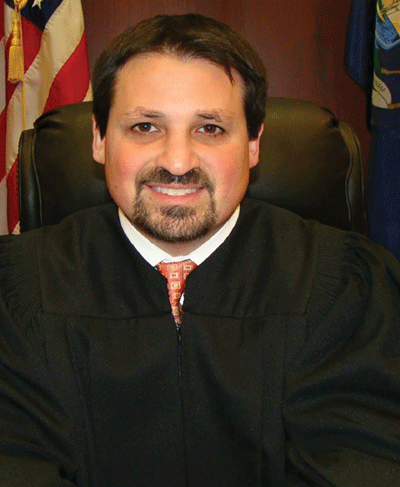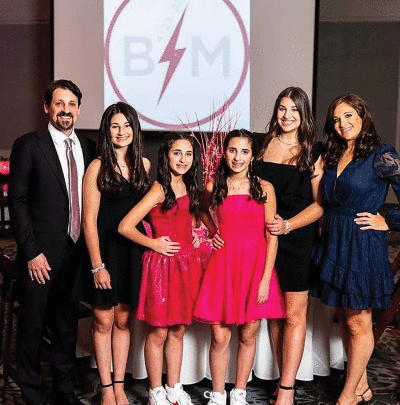
Judge Jamie Wittenberg, of the 44th District Court in Royal Oak, died Nov. 20 after a battle with stage 4 brain cancer.
Photo provided by the 44th District Court

Wittenberg is survived by his daughters Talia, 15; Brooke, 13; Maya, 13; Arielle, 17; and his wife, Staci.
Photo provided by Robert Wittenberg
OAKLAND COUNTY — Jamie L. Wittenberg, a judge in the 44th District Court, died Nov. 20 at the age of 48 after a three-year battle with brain cancer.
Wittenberg had served as a judge since he was first elected in 2008 to the 45-A District Court in Berkley. The court merged with the 44th District Court in Royal Oak in 2015, where he served for the last seven years. He was reelected to his seat just over a week before he died.
Surviving Wittenberg is his wife, Staci; his four daughters, Arielle, Talia, Brooke and Maya; his mother, Mollie; his father, Howard; his brother, Robert; and his sister, Jodie.
Jamie and Staci Wittenberg were married for 19 years and together for more than 22 years. Describing who her husband was as a father, Staci Wittenberg said he was very much a family man and a hands-on dad with their children, and that what you saw with Jamie is what you got.
“He didn’t act differently at work than at home,” she said. “He’s just pretty down to earth. He wasn’t showy. He was very much like the boy next door. He grew up in this area and stayed in this area. I don’t think there was a lot of people, like, that would maybe know his profession. Honestly, like in our soccer families or anything like that, if we went to a restaurant and we’d run into someone he knows … he never wanted any special treatment or favors.”
Three years ago, Wittenberg was diagnosed with glioblastoma. A combination of traditional medicine, ketogenic diet and intermittent fasting was credited for helping Wittenberg survive three times longer than what he was given with his initial diagnosis.
Robert Wittenberg, Jamie’s younger brother by seven years and Oakland County treasurer, saw his brother battle stage 4 brain cancer from which he was expected to live 12-15 months.
“His doctors said they never worked with someone who really took control of their future,” he said. “He changed his diet. … He would do a three- to four-day fast, really trying to starve the cancer. He was really passionate about his family and the work he did, and he always said he had a lot to live for, and so he wanted to battle it. And he battled it to the very end.”
Robert Wittenberg remembered growing up with Jamie, sharing a room with him from when he was born up until Jamie left for college. Even through sharing a room all those years, he said he never fought with his brother.
“I think part of it is … he’s very easygoing and very easy to get along with, kind of like a good nature,” he said. “I always tell that story that he was just like the best brother in the world because we got along; he was always there for me. You know he was like a mentor to me, and I’ve always looked up to him as a little kid, and even in my professional career, he was always a support for me and someone who was helpful, both personally and professionally.”
Wittenberg’s fellow judge in the 45th District Court, Derek Meinecke, began working alongside him in 2015.
Meinecke called working with Wittenberg a joy and a privilege, and said that he was more than a benchmate to him; he was also a friend.
“Over time, we would talk about cases and our plans for the court, and, you know, we had a similar vision,” he said. “The way we wanted to serve Berkley and Royal Oak and the type of approach that we took to the bench was very similar, but we’re also dads and husbands and sons and we were sports fanatics, and there really wasn’t a bad day working with Jamie Wittenberg, other than watching him take on this battle.”
Wittenberg was credited with spearheading the expansion of the 44th District Court’s sobriety court program and the introduction of a teen court that was aimed at supporting at-risk youth.
Meinecke said Wittenberg doubled the size of the sobriety court and helped make it one of the most successful in the state.
“It is impossible to go through a day and not see a way in which this courthouse — the staff, the litigants that appear in the court — it’s impossible to look around and not see Jamie’s presence, not see the way in which he sort of changed things for the better,” he said.
“When you’re constantly reminded of what you had, that does make the loss feel that (much) more substantial,” he continued. “But the hope is he left the playbook. He left the playbook for how to be a good and fair and decent judge. And it starts with humility, it starts with compassion, it starts with decency and understanding that this seat doesn’t belong to the person that’s currently in that role. We’re just stewards, and it’s our job to make sure that, in our time, where we are blessed to and fortunate enough to be in a position to serve, that we maximize that for the betterment of the community.”
Staci Wittenberg said what she’ll miss most about Jamie is his presence around the house and the time he devoted to his family.
“Like family-time conversations, just having his presence around for all of us,” she said. “There’s definitely an emptiness, and for the girls, you know, they’re all coping with it differently. I would say some of them would say probably his advice, some of them would say probably just cuddling up in bed watching a show, some of them would say his sense of humor. I think we all just take something different from him.”
 Publication select ▼
Publication select ▼




























